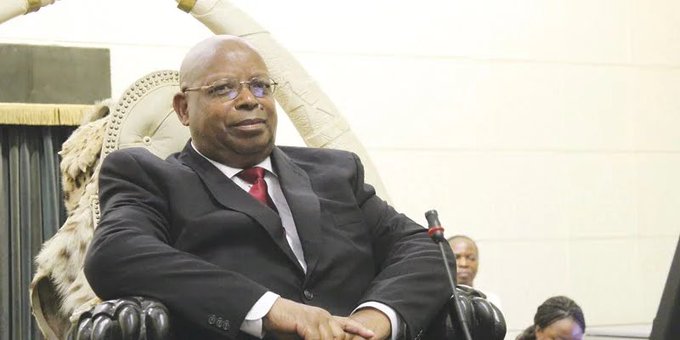|
Getting your Trinity Audio player ready…
|
Human capital development is central to the overall socio-economic development matrix, Hon Jacob F. N. Mudenda, the Speaker of Parliament of Zimbabwe has said.
He made the remarks during the Plenary Session on “Investing in Human Capital Development: Legislative Priorities in the COVID-19 Era” at the conference of Speakers and Heads of African Parliaments held in Abuja, Nigeria, from the 9th to the 11th of May 2022.
Hon Mudenda said the conference was an affirmation of the infectious aspiration espoused in the African Union’s Agenda 2063 of “a prosperous Africa based on inclusive growth and sustainable development.”
“The Agenda further posits that this aspiration can only be attained through a well-educated citizenry and a radical skills revolution undergirded by science, technology, and innovation for the development of Africa’s human and social capital. Needless to say, this convention could not have come at a more opportune time than this when the world is grappled with the crippling impact of the COVID-19 pandemic and the devastating effects of the Russo-Ukraine crisis. It is, therefore, only befitting that I extend my heartfelt commendations to our host for successfully organising such a critical discussion despite the ever-imminent threat of the COVID-19 pandemic,” Hon Mudenda said.
The Organisation for Economic Co-operation and Development (OECD) conceptualises human capital as “the knowledge, skills, competencies, and attributes embodied by individuals that coalesce to create personal, social and economic well-being at a societal level. Additionally, drawing from the SADC Regional Indicative Strategic Development Plan (2020-2030), human capital development incorporates a process of developing and implementing programmes, in order to improve human capacities for socio-economic development, in areas including: education and human resource development; health, HIV/AIDS, pandemics, and other diseases of public health concern; poverty eradication; employment and labour; food and nutrition security; and gender equality.
While human capital development is central, the COVID-19 pandemic and the Russo-Ukraine war have threatened to reverse Africa’s gains in its human capital development matrix.
Hon Mudenda said the pandemic adversely impacted not only the current well-being but also weakened the stocks of human capital that will shape the future well-being and resilience of the world and Africa in particular.
“Across the globe and in more than 80 countries worldwide, the COVID-19 pandemic led to tens of millions of potential years of life lost (PYLL). More importantly and rather disconcertingly, the pandemic robbed us of the future shapers and change leaders of Africa.
“Additionally, while the learning disruptions caused by remote schooling at all levels (primary, secondary and tertiary) are of immediate concern for the acquisition of knowledge and skills, time spent away from employment, education and training implies an important loss of human capital. Record numbers of people are unemployed, underemployed, or marginally attached to the labour market. In particular, are those in the youngest age cohort – which could lead to scarring effects that persist well into the future. For young adults who began their careers amid the Global Financial Crisis, the pandemic is set to compound their disadvantages. Estimates by World Bank suggest that learning poverty in 2021 increased to about 70% in low- and middle-income countries. This, combined with the deskilling effects of prolonged unemployment and underemployment, is likely to lower future productivity and earnings in many countries. Unless they are addressed with decisive investments, the scars of COVID-19 on human capital and future productivity could deepen and turn permanent,” the Hon. Speaker said.
He said for most developing countries like Zimbabwe, curtailing the impact of the pandemic on the human capital development process was not an easy task.
The pandemic alerted the country to the deficiencies in skills development practices and the gaps in the skills that are deemed future-proof.
Hon Mudenda said most of the developing world and particularly in Africa was not insufficiently prepared to anticipate and address the current and future skills demands.
“It is important to note that prior to COVID-19, many countries in Africa were not investing sufficiently in building human capital. Consequently, when the pandemic hit Africa, most countries did not have the capacity, resources, and experience to handle the pandemic on the medical, legislative, and socio-economic frontiers. It further became apparent that COVID-19 was a global crisis and international cooperation was critical. The WHO noted that COVID-19 would affect travel and trade between nations and therefore demanded additional legislative prioritisation.”
Across Sub-Saharan Africa, economic growth contracted by -3.0% in 2020 due to the COVID-19 pandemic. While the African region has, thus far, been relatively less affected by the COVID-19 pandemic in terms of recorded deaths, the socio-economic ramifications were far-reaching. These included depressed foreign direct investment and remittances, low tourism activity, and disruptions to economic activity due to the implementation of the legislation on containment measures such as lock-downs. The WHO guidelines and protocols became the default rule of thumb for many countries to follow as containment measures.
